Planned game
Break the bricks
Free kick
Labyrinth
Memory game
Firework game
Puzzle
Obstacle course
Pick your phone
Bunny-jump
Gardener game
Birdie game
Virtual piano
SUM
1. Other movements
x
x
x
x
x
x
x
7
2. Lift basket
x
x
2
3. Fold towel
x
1
4. Turn key in lock
x
x
x
3
5. Lift pencil
x
1
6. Lift can
x
x
2
7. Reach and retrieve
x
x
x
x
x
5
8. Extend elbow-weight
x
x
x
x
4
9. Extend elbow-side
x
x
x
x
x
5
10. Forearm to box
0
11. Forearm to table
0
Out of these games five games have been completed (during the early development stage): “Break the Bricks” (BTB) (Fig. 5.1) [13], “Wordy Labyrinth” (Fig. 5.2), “Labyrinth” (Fig. 5.3), “Memory” (Fig. 5.4), and “Free Kick” (Fig. 5.5) [34, 35].
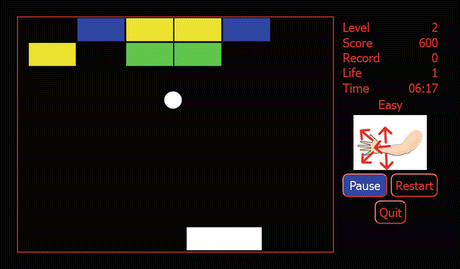
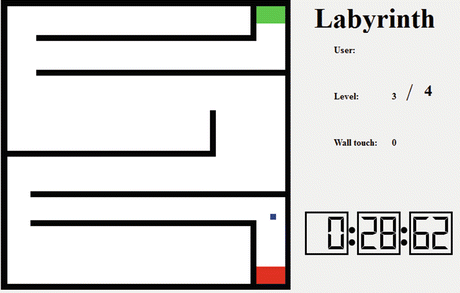
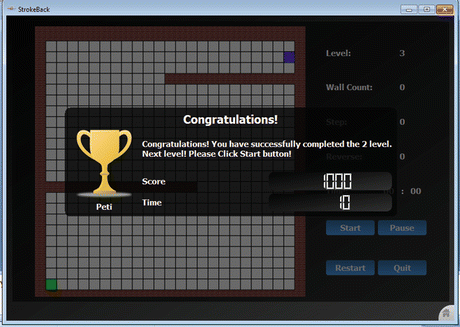
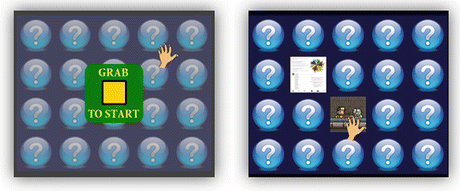
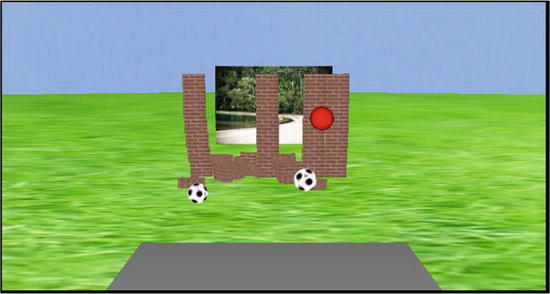

Fig. 5.1
Initial version of the BTB game

Fig. 5.2
Initial version of the Wordy Labyrinth game

Fig. 5.3
Early version of the Wordy Labyrinth game

Fig. 5.4
Starting version of the Memory game

Fig. 5.5
Initial version of the Free Kick game
In the early development stage the games were tested over several cycles, but despite the positive feedback of the users the therapists took out four of the games from the further development process, only BTB remained. Therefore in the second step there were developed two more games: “Birdie” and the “Gardener” games.
5.3.1 “Break the Bricks” Game
BTB is a classic brick breaker game. It was a very famous arcade game in the 1990s. The goal of the game is very simple: smash the wall of bricks by deflecting a bouncing ball with a paddle (it could be a car, or a train, etc.). The aim of this game is to clear the screen by breaking the bricks appearing on the top of it. To break a brick, hit it with the ball several times (Fig. 5.6).
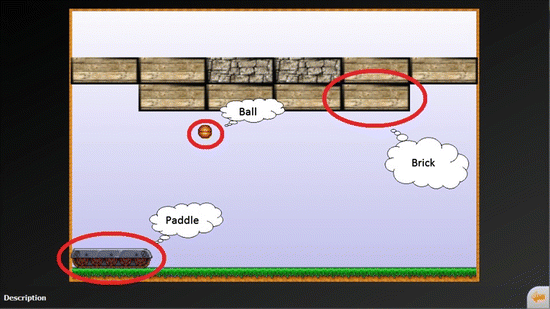

Fig. 5.6
The BTB game
The brick types can be seen in Table 5.2.
Table 5.2
The brick types
Image | Type | Lives |
|---|---|---|
   | Wood | 2 |
   | ||
   | Rock | 3 |
   | ||
   | Brick | 4 |
   | ||
   | Metal | Cannot be smashed |
   |
For hitting bricks (if its type is not metal),  points are given,with smashing one,
points are given,with smashing one,  points can be earned.
points can be earned.
 points are given,with smashing one,
points are given,with smashing one,  points can be earned.
points can be earned.If the ball falls down it means −20 points from the score.
If the user finishes with a level within a shorter time than the previously set up average time, the points calculated from the time difference will be added to the score (1 s means one point).
The available themes of this game: default (original skin), car, cake, duck, ship, train.
To control the pad, the dedicated “left” or “right” movement should be done. The ball can be started with the dedicated “start” movement.
If controlled with the keyboard, the following keys shall be used: start the ball: space, movement: left and right or A and D, help: F1, menu: Esc.
5.3.2 “Birdie” Game
In this game the aim of the player is to help a bird to get back home. The birdie is flying home, and the goal is to keep it in the air and prevent it from colliding with the obstacles, which can be other birds, rocks, trees, etc. If the bird bumps into something, the game will continue from the actual point, and the level won’t restart [41]. On the bottom of the screen a progress bar can be seen, which shows how much of the course is accomplished by the birdie, and how much is left (Fig. 5.7).
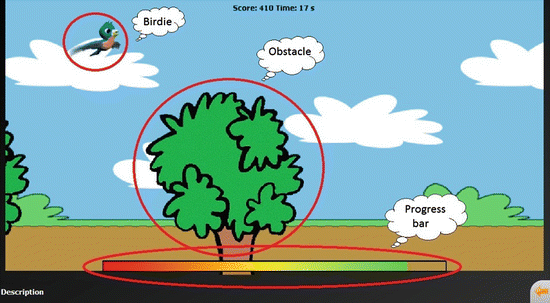

Fig. 5.7
The Birdie game
The main scores are derived from the distance travelled and the speed of the bird.
The player can get extra points by completing the level in a shorter time than the average, like in the BTB game.
If the player can finish a level without hitting any obstacles or falling down, extra points will be given.
If the little bird falls down, it means minus points from the score.
The available themes of this game: default (original skin), cave (played with a bat), circus, forest, jungle, mountain, sea, town, winter.
To fly the birdie, the player has to make an “up” movement. To descend faster, the player has to make a “down” movement.
If played with the keyboard, press “Up” arrow (cursor keys) to fly and the “Down” arrow to descend.
5.3.3 “Gardener” Game
The task of the player is to make the plants and flowers growing one by one [29]. To grow a plant, the player has to water it several times with a dedicated movement [36, 37]. After a plant grows up, the player can continue with the next one till all of the flowers or plants in the garden are grown up. The status bar shows how many times does the actual plant be sprinkled until it becomes fully grown (Fig. 5.8). The count of these sprinkles is called “Required” motions.
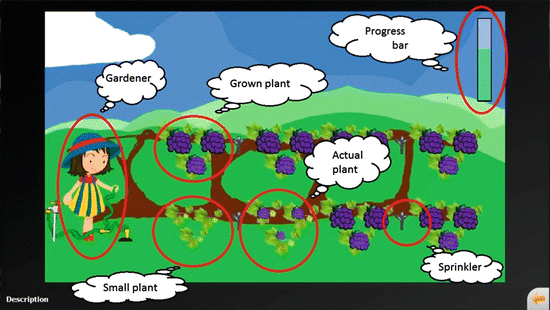

Fig. 5.8
Gardener game
If the player waters the plants too slowly, they will start to wither (their color will turn to gray). There is a big exclamation point glowing above the withering plant to warn the player. The time interval between the last watering and the withering is called Fading time (Fig. 5.9).
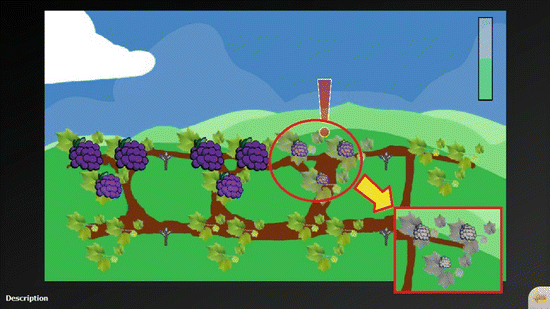

Fig. 5.9
Fading in the Gardener game
The player can attend more kinds of plants, for example roses, grapes, or tomatoes.
For each movement, the player will get  points, and completing a plant means
points, and completing a plant means  points. If the plant is grown up without withering, it means
points. If the plant is grown up without withering, it means  points for the player.
points for the player.
 points, and completing a plant means
points, and completing a plant means  points. If the plant is grown up without withering, it means
points. If the plant is grown up without withering, it means  points for the player.
points for the player.There is an extra time bonus too, which is calculated based on the elapsed time, the number of the plants, and the count of the required movements.
The available themes of this game: bluebell, carrot, currant, geranium, grape, pepper, rose, strawberry, tomato, tulip.
To spray a plant, the player has to make a dedicated spraying movement.
If played with the keyboard, press “Space” to spray.
The movement of the gardener/hose is automatic; the player can only control the watering.
5.4 Redesign the Games
The first clinical test was made by nine stroke patients in the Brandenburg Clinic in Bernau (Berlin) early May 2013. We got several positive and negative feedbacks and good ideas from the patients too [36, 37, 43, 44].
5.4.1 Opinions of the Therapists and Patients
The BTB game was the most high-developed in the early testing phase; nevertheless the therapist opinion was not so high positive. They suggested more varied pictures on the bricks. A male patient’s opinion was that this train reminds him of a tank. After it the BTB game’s graphic design was improved.
The Birdie game also worked very well in the early test, and the graphics were really beautiful. But the therapist’s opinion was that we have to develop more interesting locations with a lot of objects. Another male patient’s opinion was that this game is very “girly”, and why do not we put into the game for example a bat. Based on these remarks some new locations were designed and added to the game, including a bat theme.
The least developed game was at that time the Gardener game, therefore its redesign is showing more details.
Stay updated, free articles. Join our Telegram channel

Full access? Get Clinical Tree








